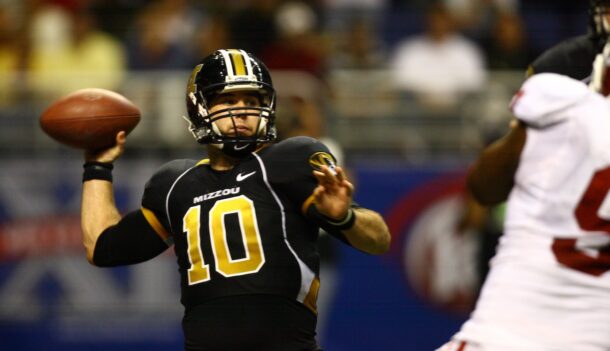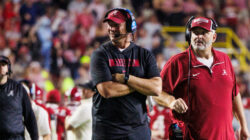
Florida fans are rightly displeased with how the 2020 season ended.
The Gators lost their final 3 games, including an embarrassing 55-20 loss to Oklahoma in the Cotton Bowl.
Of course, there has been significant progress in the Dan Mullen era.
Three consecutive trips to New Year’s 6 bowls is an impressive accomplishment, one that puts the Gators back in the upper-echelon of the sport, something that could not be said before Mullen returned to Gainesville.
Florida also wrestled the SEC East back from Georgia in 2020, routing the Dawgs in Jacksonville in the process.
And anyone who watched Alabama steamroll through the College Football Playoff had to agree that the best test the Crimson Tide received all season came in the SEC Championship Game against a healthy, full-strength Florida. The Tide won by 6, but the Gators very much belonged on the field with the eventual national champions.
But this is Florida, a place where being encouraged by moral victories and inspired by incremental progress only goes so far. Florida fans want championships, and as Mullen enters what appears to be a transitional fourth season in Gainesville, there’s work to do for Florida to take the last and most difficult step yet: winning a title.
Here are 6 offseason priorities for Florida football in 2021.
1. Can new assistants rebuild DBU?
Mullen elected to keep Todd Grantham, a fascinating decision that may define his tenure at Florida.
Florida surrendered 30.8 points per game, allowed opponents to convert 41% on 3rd down and managed to lose 3 games when its offense produced 34, 38 and 46 points. In Florida’s bowl game, an Oklahoma team that only found balance late in the season ran for 400 yards.
Here’s the thing: Florida’s defense has talent. In fact, per the 247sports.com team talent composite, the Gators had more blue-chip talent on defense than offense in 2020. That will remain the case in 2021, so can Grantham coax the most of that talent?
The place they’ll need to start is in the secondary.
Florida has long been one of three SEC programs with a claim on “DBU,” but those days seem long past. In 2020, Florida finished 96th in pass efficiency defense (behind rival FSU!) and 88th in yards allowed per pass attempt.
Those numbers must change, and it was no surprise that Florida elected to dismiss their secondary coaches following the season and bring in two new faces on the back end. Wesley McGriff, who consistently got more with less at Auburn, and rising star Jules Montinar, who comes from USF but spent time learning his craft under secondary guru’s Kirby Smart and Nick Saban.
They’ll have a talented young corps, but will it be enough to spark a turnaround?
2. Recruit bettter
COVID-19 has made recruiting difficult. Campus visits are voluntary, coaches don’t travel much, and weekend camps have largely been replaced by virtual events. Couple these virus-related changes with the fact Florida has been serving NCAA imposed probation punishments for much of 2 seasons and the question of whether Florida can recruit at a level closer to fellow SEC powers Alabama, LSU and Georgia remains an open one.
Montinar should help.
A young guy with an engaging personality, Montinar served as recruiting coordinator at USF and prior to that was considered one of the Sun Belt’s top recruiters at Texas State, a role that earned him a spot on Kirby Smart’s staff in 2019. Montinar is also a native of Naples, giving the program a young face with many in-state ties, something that this staff needed desperately.
The question now is whether Montinar, coupled with a second year from ace recruiter Tim Brewster, is enough to propel Florida into more high-level national recruiting battles.
Florida closed the talent gap in recent years based on math: They had fewer blue-chip players when Mullen arrived and now have more, meaning the gap between the self-sustaining recruiting behemoths at Georgia and Alabama became tighter. Closing the gap even more will require winning more recruiting battles — something Florida hasn’t done yet.
3. Adjust the passing game for Emory Jones
This is the offseason priority that inspires the most confidence. Mullen is a master at catering his offense to the strengths of his quarterback, and he’s had a long time to think about how to do that for Emory Jones.
Replacing a program great and Heisman finalist at quarterback won’t be easy, but Jones will be in his fourth year on campus in 2021, and Mullen’s history with quarterbacks well-versed in his system is a strong one. Most of Mullen’s greatest quarterbacks had to wait their turn, including Kyle Trask, Tim Tebow and Dak Prescott.
It’s now Jones’ turn. Jones is not going to be as adept at the pocket passing stuff that Florida ran so well with Trask, but because of his elite mobility, he doesn’t have to be.
Jones has a good arm and advanced analytics show that in a small sample size, he’s a good downfield thrower. His issues from an accuracy standpoint have come in the short, precision pass game that Trask ran better than almost anyone in the country.
This will force adjustments in the pass game, but given his mobility, those were expected. What Florida’s pass game will look like probably takes shape in the spring — but you can expect this offense to resemble the Prescott Miss State offense more than anything the Gators ran with Feleipe Franks or Kyle Trask.
4. Find answers at the playmaker positions
A season ago, Florida had to replace 4 NFL-bound wide receivers ahead of the season without the benefit of a spring practice. It was a heady task, but at least Kyle Pitts remained on the roster as a security blanket.
We all know how that turned out: Pitts shined, putting together one of the best seasons ever for a college tight end on his way to winning the Mackey Award as the nation’s best at the position. Kadarius Toney put together a sensational senior campaign, tallying over 1,000 yards of total offense and 11 touchdowns on his way to being named a finalist for the Paul Hornung Award (he lost to DeVonta Smith). Trevon Grimes also had an outstanding senior campaign, catching 9 touchdown passes, including 2 in Florida’s biggest 2 games (Georgia and Alabama). Simply put, the Gators lost a ton of talent and didn’t miss a beat.
The outlook in 2021 is less rosy.
Florida will enter the season without their top 3 pass-game production pieces, and of their top 5 in that department, only Jacob Copeland returns at receiver. Transfer Justin Shorter had nice moments in 2020 but was quiet in the Cotton Bowl with his more polished teammates opting out. And while Keon Zipperer and Kemore Gamble are nice tight end prospects, it will be nearly impossible to replace Pitts, who is in a small conversation about the best tight end in the history of college football.
Florida desperately needs a spring practice session to sort this out– and will need big leaps from the likes of Shorter and highly-touted recruits Xzavier Henderson and Ja’Quavion Fraziars, both freshmen a season ago.
5. Bolstering the anemic run game
Until 2020, Mullen’s best offenses were offenses predicated on establishing a power running game and then taking shots to electric athletes in the vertical passing game. At Florida (as an offensive coordinator) and at Mississippi State (as a head coach), Mullen led offenses that finished in the top 10 in rushing offense success rate 7 times, more than any other SEC program in that span.
Florida hasn’t had a power run game the past 2 seasons. Florida ranked 56th in rushing success rate in 2020 and 68th in 2019. It’s hard to blame that on running backs. LaMical Perine was one of the SEC’s most bruising and talented runners in 2019, and he finished 2nd in the SEC in yards after contact as a senior. Florida had yet another back (Dameon Pierce) finish in the top 10 in yards after contact in 2020, a sign that the running backs are finding ways to grind out yards on the ground when holes aren’t there.
Will Jones fix the run game by simply providing a different wrinkle offensively? He will help — but as the full-time starter, he can’t be asked to carry the ball 20 times a game constantly.
More likely, offensive line coach John Hevesy and the Florida staff will need better performances up front. The Gators have nice young pieces on the offensive line that appear to be the type of space eaters you need to run the ball in the SEC. Ethan White is a load, Michael Tarquin is a blue-chip whose practice issues were about pass blocking, not run blocking, and the staff is very high on freshman Josh Braun. The return of Miss State transfer Stewart Reese will help, if for no other reason than Reese is familiar with Mullen’s blocking scheme and comfortable in an offense featuring a mobile quarterback.
Things should be better — but we’ve written that before.
6. Special teams questions
A quiet story in the offseason for Florida?
The departure of the program’s 3 key special teams pieces. Punter Jacob Finn is transferring, despite averaging 46.7 yards per punt in 2020. He’s expected to give way to Australian punter Jeremy Crenshaw, but the Aussie didn’t win the job last year, raising at least a yellow flag.
Toney, one of the league’s best return men, is gone. He changed the tenor of a dicey Kentucky game by taking a punt to the house before the half.
5️⃣0️⃣ YARD PUNT RETURN TD ?
Kadarius Toney puts @GatorsFB on top at the half! pic.twitter.com/yIUBI8Vh98
— SEC Network (@SECNetwork) November 28, 2020
Finally, Florida loses Evan McPherson, the 3-year starter who was the SEC’s most accurate kicker in that span. McPherson missed only 9 field goal attempts (51-of-60) in his career and while one of those was a 51-yard attempt to tie the LSU game in December, he was a weapon who put Florida in scoring range from anywhere inside the opponent’s 40. Replacing him won’t be easy — a problem compounded by the fact the Gators did not sign a kicker in the Early Signing Period.
Rebuilding a special teams unit that ranked 5th nationally in S&P+ special teams in 2020 will be a big challenge for Florida, and a priority for a team that figures to have a smaller margin for error in 2021.
Neil Blackmon covers Florida football and the SEC for SaturdayDownSouth.com. An attorney, he is also a member of the Football and Basketball Writers Associations of America. He also coaches basketball.







